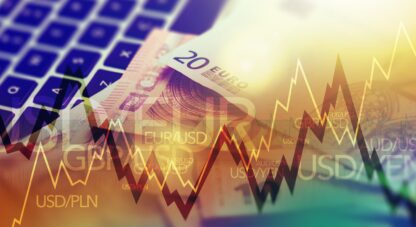A Look At This Weeks Show:
- Goldman Sachs helped Greece hide it’s dirty laundry in 2001 – now the ECB moves to block disclosure.
- Are gold and silver having their last seasonal correction before the rise to new highs?
- Machiavellian Economics – or, how to control a crises by controlling the press.
The McAlvany Weekly Commentary
with David McAlvany and Kevin Orrick
Kevin: David, it seems that every time a sort of criminal act that is called a financial necessity occurs, Goldman-Sachs seems to be in the mix. I thought that was just here in the United States, but we are starting to hear things about Greece and Goldman-Sachs.
David: When you go to the Morgue, you are asking the question, “How did we get here? What happened?” That is basically what we have in Europe. As we go to the European Morgue – how did we get here? Why do we have the problems that we have with Greece, with Spain, with Portugal, with Italy, with Ireland?
Kevin, it is interesting – you suggested, and it is accurate, Goldman was a part of it. Going back to 2001, Goldman created a number of currency swaps, 13 to be precise. These were off-market derivative contracts, and they were swapping yen into euros.
Kevin: Why? What is it that a currency swap would have done in 2001 that would have aided Greece in some way?
David: These were specifically done with the Greek government and they were to conceal the true size of the nation’s debt. This comes from the European Union’s statistics office, reported by Bloomberg.
But the point is, you have an organization which is purposefully creating fraudulent data and perception in the marketplace so that Greece can be welcomed into the euro, Greece can be viewed as a stand-out citizen, future contributor, to the European Union, and with a pristine balance sheet. This is one of the things that cost Arthur Andersen its very survival.
Kevin: Sure. It’s deceptive accounting. It’s purposeful, deceptive accounting, because Greece had to have a certain look before they entered into the European Union.
David: What is particularly interesting, Kevin, is the ECB fears this information being discussed openly. They have moved to block disclosure. In fact, there is a court case, right now, being heard in from of the EU’s general court, and the ECB is trying to get it dismissed. This lawsuit is seeking to disclose the actual use of these derivatives, set up by Goldman, with the Greek government, in order to hide the real financial condition of the Greek government at the time.
Kevin: Okay, Dave, it is easy for us to sit over here in the United States and look over at Europe and say, “Boy, those guys are absolutely messed up,” but he who is without sin needs to cast the first stone. This sounds to me like what our government has done with the FASB rules. They don’t really want true accounting to show up because, boy, it’s an ugly picture.
David: It’s true, Kevin. There are a lot of similarities between the way we account for things, or want them viewed, by our foreign creditors, so truly, there is no one who is lily-white here.
With today’s conversation, we are going to talk a little bit about Greece and Portugal and the euro. We have some ground to cover in talking about the dollar, gold and silver and the correction they are in presently, some dynamics of the Dow and the S&P, a strong look at U.S. consumer inflation. Of course, it is on everyone’s mind what is happening with the debt ceiling and how that will be resolved and what the implications are.
Kevin: It doesn’t sound like there is a ceiling, David. It feels like that ceiling just keeps getting raised and raised as government retirement funds get lower and lower. But I would like to hear from you on that because I wonder how they feel.
David: Back to Greece and Portugal, in particular. The 78 billion dollar euro bailout is moving forward for Portugal, and what is unprecedented is this: They are requesting, or requiring, that private bond-holders keep what they own. In other words, no liquidations are allowed. That is the first time that this sort of voluntary pledge has been requested from private creditors. So, is it a requirement? Not necessarily. But it certainly is a strong request.
Kevin: They will strongly frown upon anyone who wants to cash in their absolutely fine and perfectly liquid bond. They just can’t cash it in.
David: Right. So, it’s being put out there as almost a condition for this guarantee of 78 billion euros for Portugal. And at the same time we have Greece, which is in what they would call a soft restructuring as we speak. This morning they are looking at extending the maturities of their loans, or of their current debt. That is not unlike you and I, here in the United States – if we took a 30-year mortgage and turned it into a 50-year mortgage, our monthly payments would go down. We would still have the same debt to pay, and we have actually more in interest payments.
Kevin: Like turning chickpeas to hummus, I mean, it’s a Greek thing you do anyway, isn’t it?
David: (laughter) Well, extending maturity, certainly, and it is not the first time that there has been a restructuring of Greek debt. But in Europe, I think you would have to go back to 1948 to see a major restructuring. But now they are not calling it a restructuring. It is actually a soft restructuring, because it is just an extension of maturities. Call it what you will, it is the first stage of the inevitable, which is a restructuring, and a form of default.
Kevin: Well, it’s unpayable. It’s like a lot of the debt that we have talked about. It’s unpayable. It’s just how do we extend this to make it go a little bit longer? If the complicit deception was revealed, what are some of the names that would probably surface to the top, just like cream, surface right to the top? There are some names right now that are nervous that there would be accurate reporting in Europe.
David: Well, and I am sure that those are the people who have been calling the ECB and calling in favors. If I were Lloyd Blankfein, I would be a little bit upset right now. If I were Hank Paulson – good old Henry was head of Goldman-Sachs, also at a period of time where those kinds of currency swaps were being orchestrated.
Kevin: They sure are clever. They are good with numbers.
David: But you see, they are not an accounting firm, so they can’t be held responsible for the deals they put together. They are a deal-making firm. That’s what they do for a living – they put together deals. So why should they be judged for doing what they are supposed to do? It is their M.O. in the marketplace.
This is where we begin to see a breakdown in trust. We have already seen it with individual institutions, where authorities who are hiding things, get caught hiding things. The ECB is betting a lot and sticking out its neck in trying to protect this information. They realize that there are unintended consequences. There are huge consequences to knowing what those deals consisted of.
Kevin, I think we would blush if we knew the back-alley deals which were done between the Fed and differential financial institutions, between the financial institutions and overseas central banks. It is just one of those things where, as we work through this cycle, as we talked with Neil Howe last week, and we get through what he considers the fourth turning, we will get full disclosure, and it is not going to be pretty. And my hope is that we don’t end up with a Robespierre and a guillotine. But there is going to be a lot of anger and frustration because of this inside dealing.
Kevin: Not just in Europe. The spotlight seems to be focused there just temporarily right now. They are still going through their trouble. We have talked over and over about the problems with the dollar. The dollar, during this period of time, even though both currencies are fiat currencies and they are falling long-term, the dollar seems to be rising right now, and that is affecting the gold market and the silver market. We seem to be in a correction in the metals right now. We have seen corrections in the past, in the bull market back in the 1970s, but there was a point when we didn’t see corrections. Can you take us through that a little bit?
David: I hate to sound like a parrot, but it was last year this time that we were talking about the seasonal correction of gold, usually a strong finish into the spring, and then when you go into the summer months, and traders are taking vacations, for lots of different reasons, you have a seasonal correction in the metals. This year we got an extra boost with the CME changing margin requirements, we have talked about that in recent weeks. It is these seasonal corrections that you can begin to anticipate, and as a trader, as an investor, take advantage of. My one concern is this: As you move further into a bull market, those seasonal corrections don’t appear. I am thinking of 1974, 1975, 1976, and 1977.
Kevin: David, we are getting into family history now, because the origins of your father’s and mother’s starting of this firm were in the 1970s. That was remembered as the last great bull market in gold until this one, and there are a lot of patterns to learn from. Fortunately, you were raised in that period.
David: Yes, and it was those years up until 1977 when you could expect seasonality – a soft patch in the summer months, very expected, very predictable, you had taken two steps forward, one step back. Gold had been in a bull market for many years and had gone from 35 dollars to over 165 dollars. And then as we moved into 1978 and 1979, if you were expecting a correction to come, it wasn’t there, it didn’t materialize.
Whatever the bull market is, whether it is real estate, whether it is technology stocks, whether it is gold and silver in this particular case, when you get to the final phase of a bull market, seasonality goes out the window, and technical traders, who consider themselves geniuses up that that point, get left out and are on the sidelines for the big moves.
Kevin: For the last 30 years, we have talked to two types of people who remember those years, if they were adults. There are those who said, “Gosh, I was so close to buying, but it just kept moving up.”
David: “I could have bought it lower, the price was moving up, and I thought, surely it is going to correct, it will give me an opportunity.”
Kevin: It was coulda, shoulda, woulda. But there was also the guy who finally said, “This thing is just going to go up forever,” and at 850 bucks he bought gold and really didn’t see $850 until just a couple of years ago.
David: Right, and I think some of the important work we do on the program here, because we are trying to identify trends, as well as transitions, and the trends remain in place for the metals. The transition points, we have not yet seen, but we are looking at them and looking for them, feverishly, every day.
As we move further into this bull market, I am getting less and less sleep. I am concerned, because these are dynamics which are quickly becoming third-stage bull market dynamics. I think the last move in silver up to $50, from $17.50 to $50, was a foreshadowing of what we will see in the gold market, and ultimately what we will see in silver, taking it to much higher prices, $50 being left behind in the dust. This is a transition – an intellectual and emotional transition point for clients, as they look ahead and realize that the market dynamics are changing utterly. If they are assuming that the markets are going to remain rational, if they are assuming that they are going to remain predictable, with sort of a two steps forward, one step back, they are sorely mistaken.
Kevin: But, at this point, we do have a luxury that we may not have down the road. We have a luxury that we are, wouldn’t you say, in a correction right now?
David: I think the probabilities favor this being the last seasonal correction in this particular bull market, wherein next year and the year after, as we move to 2012, 2013, and 2014, things begin to move at a pace where it simply blows your hair back. I think what we see now, off of a peak of $1577 on the gold price, is roughly a 10% correction. That would take us to roughly $1420, and I think that is where we see an excellent entry point. Between $1450 and $1420 if you are not aggressively buying, I think this is going to be the low point for the year. You have the 200-day moving average, which is a little bit lower at $1365, and it is moving higher every day.
We have a number of technical supports which are actually rising to meet the current price of both gold and silver, I think, make a compelling case for entering the metals over the next two, three, four weeks.
Kevin: So you are basically saying we are 5-10% away from a bottom that we may not see for the rest of this bull market.
David: I think 5% on gold, probably 10% on silver. We are sitting at around 33 and change today on the silver price, and I would be aggressively buying between 35 and 31. Why not just pick 31 and say, hey, it’s a better number, it’s a better entry point? Because there are enough clustered reasons at that price for every trader and their brother to be entering the market at the same time, and you would have to be so fast on the trigger, by the time we get to $30-31 an ounce, that I don’t think many investors will actually take advantage of that pricing.
Kevin: So what you are saying is, it is actually a good idea to buy maybe a little early, or sell a little early, in the quiet, than when it is just a roaring crowd.
David: What you just suggested, Kevin, is utterly, utterly important for clients to remember. It is not just on the purchase side, but on the liquidation side. You always sell too soon, you always sell too soon. If you leave something on the table, and you feel you could have made more money, you really don’t know what you are doing as an investor. That is the only way you make money as an investor, by leaving something on the table, because when the masses try to move to the exits at once, the odds are against your being able to move out of any market.
Look at real estate today. There was a time when you could sell your house in roughly weeks. We sold our house, by a sale by owner, in a matter of weeks when we left California. Now, if you have the greatest representation in the market, someone with 25 years of marketing and sales experience in real estate, you couldn’t move your Southern California home in three months, six months, maybe even year or two. We are talking about a change in the dynamics of the market, where you have liquidity up until a point, and when the market turns, liquidity goes away, unless it is at an extremely discounted price. That is not where we are at today, Kevin, but as you suggest, as you look ahead and say, “Okay, higher prices in this particular bull market – Sell too soon.” The old adage from Mayer Amschel Rothschild, “Buy when there is blood in the streets, and sell too soon,” is something that I think clients can keep in mind.
Kevin: Dave, this brings up a good point. We are all hopeful people. As Americans, we want to have hope. The market name for a hopeful market is a bull market. The market name for a market in despair, or a dropping market, is a bear market. The bulls, especially, love to run in a crowd, but you have to be a solitary-minded person, whether you are a bull or a bear, to get in, or out, at the right time. So, David, in a nutshell, what you are saying is this may be the opportunity, the last real correction on these markets before we start seeing just pure up-moves.
David: On its way to $2000 gold and $100 silver, yes, I think so.
Kevin: Something that I know you watch that a lot of investors don’t, is the volatility index. Is the volatility index telling us anything right now about the stock market, the paper markets?
David: I know we mentioned this a couple of weeks ago. The VIX was at about 14.5 and it is currently at about 18.5, so we have seen a 27% move in two weeks, in the volatility index.
Kevin: What you are saying is more volatility, and that is usually a shaking before a breaking.
David: Yes. Essentially, when the volatility index gets down to 10 or 15, you are just begging for a correction in the stock market, because what it tells you is that everyone is already loaded to one side of the boat, and it is the bullish side of the boat. Everyone is assuming that it is all blue sky from here, and it is only happy days that will be here from now to the foreseeable future. What you generally see, at that point, is an inflection, and this coincides with the end of the positive six months of stock investing. They say, “Sell in May, and go away.” Why is that? Why is that an old Wall Street adage? Sell in May, and go away.
Kevin: Is there a seasonality to the pattern?
David: There is, and basically, the good six months of the stock market end in May, and the worst six months just begin.
Kevin: Remember October. Every year. Remember October. Almost every year, it’s a bad month.
David: We are in the negative seasonable period. We have the VIX, which tapped a low at 14½ and there is nothing really compelling there in terms of value. Would we suggest a correction in the stock market? I think we are slotted for one.
Kevin: How about emerging markets? That is something that people watch, because they are so darned exciting.
David: Well, this is sort of a balance sheet issue. As you look at the U.S. balance sheet, as you look at the European balance sheet, everything is being skewed toward healthier balance sheets elsewhere. It is not that you have less risk or less volatility in the emerging markets. In fact, you have more risk, and more volatility in the emerging markets, but you have a lot of companies who are generating tons of revenues overseas and have relatively healthy balance sheets. I think that has pretty much been priced into those shares, so even if you could make a case for investing in the emerging markets, as opposed to the developed market world today, I think you are talking about rich premiums, and that is not where you make money.
You make money buying at discounts and selling at premiums, not buying at premiums and selling at even higher premiums. That momentum kind of trade is what gets people in trouble, and I would suggest that whether it is the developed market or the emerging markets, you have plenty of risk that you are taking and putting into your portfolio, if you are out buying equities, here, or yon.
Kevin: So, really, in the stock market, or any financial market where you are trying to make money, you don’t want to buy something that is accurately priced. You want to buy something that is underpriced, and what you are saying is, even if they are not overpriced right now, they are full. They are full of accuracy.
David: I think the best work that is being done right now is contrasting the developing world with the emerging world, the developed markets with the emerging markets, and it is by contrast that they are saying, clearly, this makes much more sense going to the emerging markets. If you look at GDP growth rates, they are off the charts. I guess what I would remind people of is that within the investment, you want to know what your real rate of return is, so while you may not be tied to an overseas tax regime, you are tied to the overseas inflation rate.
So if you are seeing, and if you are buying a particular company, if you are looking with interest at an overseas market, and you are looking at a growth thematic that you think is compelling, because there is a 10% year-on-year growth rate, remember what the inflation rate is, as well, and subtract that out of the growth rate before you get too excited.
Currently, the inflation rate in China is reported to be 5.4%, with a growth rate still almost double-digit. The problem is, they fudge the numbers just like the Bureau of Labor Statistics has fudged the numbers on inflation, and a more realistic view of inflation in China is somewhere between 10% if you are conservative, and I would suggest, closer to 15%, putting your annual growth rate at either flat, to negative – not positive double digit.
This is where an investor has to back away from the emotion of investing in a headline number, something that is very attractive. “A double-digit growth rate? China has to be remaking the world. This has got to be the greatest thing since sliced bread. I want in, I want in, I want in!” Slow down. Ask yourself the question, “What’s the real rate of return here?”
Kevin: That’s exactly right, David, if you lose the value of the buying power of the currency that you are in, you are not gaining, you are actually still losing. Let’s bring this back close to home. Here in America, people are excited if they get 3% on a CD at the bank, maybe 4%. They are pushing it into maybe the more risky bank accounts. The rate of inflation right now is being reported at about 3.2%. How does that actually play out in real rate of return?
David: Sure. And before we go there, Kevin, just in fairness, this isn’t to pick on China. You could say the same is true of Brazil and India, with rampant inflation in those countries, the recent correction in gold and silver, and you have bullion dealers in Mumbai and Chennai who can’t keep their shelves stocked with even the most basic bullion items, in either gold or silver – not just jewelry, but investment demand products where you are talking about bars and coins.
There is a real world inflation happening, globally, and if the price gives at all, those who are most aware of the inflation, and are sensitive to it, buy with both fists.
Kevin: And those people are not speculating on price moves, these people are just trying to hedge themselves against the buying power of their currency being destroyed.
David: Essentially, it is the masses trying to take the other side of the bet. If government is going to destroy currencies, then they have to take out an insurance policy on their savings. But the Bureau of Labor Statistics – Kevin, you mentioned our current rate. April’s numbers put our inflation rate annually at 3.2%. This is where we find a shift. Congress has ordered the Bureau of Labor Statistics, pressured them over the years, to change their methodology, the way in which they measure inflation. This is not just a group of academics at the Bureau of Labor Statistics saying, “We’ve found a more efficient way to do this.”
Kevin: They are being pressured. There is a reason, too, for that, David. What is the reason?
David: Congress made the call in 1980. Congress made the call in 1990. This methodology has changed, so, while we look at an official rate of 3.2%, if you go back to the official methodology used in 1990 by the Bureau of Labor Statistics, our rate of inflation today would not be judged at 3.2%, it would be 6½%.
Kevin: 6½? Now, that was using 1990 methodology, but that had already been changed from earlier.
David: You are right, and it gets better. The 1980 methodology would put our today’s inflation rate at the official Bureau of Labor Statistics inflation rate at 10.7%. So are we looking at 3% as a real-world inflation rate, or 6%, or 10%? And it boils down to how you want to, and how you choose to, measure the number. This is the interesting thing, Kevin, because by this appraisal, Volker was fighting the boogie man.
Kevin: Right, because there wasn’t inflation. If we use today’s numbers, we might have even had deflation when Volker was out there.
David: Yes. His efforts were a farce. In retrospect, there was no inflation in the 1970s. We need to go back and tell that generation that what they were experiencing was a mirage. It simply didn’t exist.
Kevin: It reminds me of today. They are telling us, as long as you don’t eat food, and you don’t put gas in your car, we really don’t have inflation.
David: That’s right. On a steady diet of iPads. That’s the issue, Kevin. Either the methodology was right then, or it’s right now. Either there was no inflation then, and there was a boogie man, or the numbers that we are talking about today, 3.2%, that is the mirage. That is the fiction. That is the farce. And we have a whole investment community that is assuming we have exactly what Ben Bernanke, just two weeks ago, said we had.
Kevin: Yes, they have financial TV that shows them that not only is it transitory, but they can be a “bull for another day.”
David: Inflation, in my opinion, will inflame a popular revolt, in no small part, because people will determine that their government has intentionally lied to them, and for decades has gotten to cover up their balance sheet insolvency, creatively producing a GDP figure which was not real. And we have said this many times before on the program, that if you understate inflation, the other side of the equation is that you are overstating GDP. So whether it is an emerging market problem, or a developed market problem, we have central bankers the world over, we have statisticians the world over, who know how to grind the numbers through the machine to come up with a number that is sellable.
Kevin: So, David, it really is a credibility issue.
David: When the crowd actually starts to see that prices are rising beyond what they can keep up with, there could be a major revolt. When you don’t trust your government, you don’t trust their numerous representations and promises, including the dollar system, including the system of government debt obligations and the idea that long-term promises or liabilities will be paid out, you are talking about a breakdown politically.
Or if you are not talking about a breakdown politically, an actual political revolt, you are talking about a revolt from the currency, itself, and that is the dynamic that you end up with, super-inflation or hyper-inflation. It is actually not the Fed printing more and more, it is the Fed printing more and more until a threshold has been reached, and that threshold is one of confidence and credibility. When confidence fails, when credibility is lost, then you have a revolt of the masses out of a currency. They simply want out, at any price, and they are willing to buy anything, at any price, because they don’t want to hold the worthless scrip in their hands.
That’s where credibility becomes an issue. This is a generational crisis, in that we have a fully entitled public who is looking to those long-term debt obligations, those long-term promises, and we have the majority of our population now on the dole in some form or another.
Kevin: Over 51%.
David: Let’s assume that it is 100 million people across the country who are going to be dealing with the greater likelihood of broken promises.
Kevin: Right. We have talked about the entitlement mentality before, and it is easy to point a finger and say, these people are taking money from us, and it can’t be supported. But actually, I was just talking to someone the other day about entitlements. This was a sweet lady who is retired, who does not want to see her retirement cut, in the form of Social Security. These are not bad people, all of them across the nation that are in entitlement types of programs. They are people who built the entire structure of their retirement plan based on the government paying out when the time came.
David: Yes, the social safety net meant that they could spend more and save less because they knew their retirement was going to be supplemented by Social Security. This was the promise. This was the social contract, and it is the contract that may be broken. We have the debt ceiling, which is certainly in our listener’s minds – use of federal retirement funds – that is what is being used today to supplement debt financing.
Kevin: That has to be a concern. When you are a federal worker, you are working for that retirement, most often.
David: And I guess, Kevin, what Geithner has chosen is to keep the gears of government churning by actually borrowing from federal workers’ retirement funds. I find this fascinating, because it is the first time since this crisis began, that you get a true picture of the snake eating itself, the snake eating its tail. It almost makes me smile, thinking that now the public sector gets to worry about the solvency of the U.S. government, as they watch their retirements, even in small amounts, get spent just to keep the game going. Now they know what it is like for the rest of us.
Kevin: Actually, they have skin in the game this time. You are right, in the past the federal workers have seen the markets go up, the markets go down, they have heard this, they have heard that, but in reality, it hasn’t affected their retirements, it hasn’t reflected on their salaries. Public worker salaries have gone up, while private sector salaries have gone down.
David: (laughter) It is going to be interesting to see how long the federal employees stand for their retirement funds being used to fund the functions of government. They will pressure for a higher debt ceiling. The reality is that the debt ceiling is a farce to begin with. We absorbed Fannie Mae, and Freddie Mac. We have off-balance sheet liabilities, so 14.3 doesn’t even matter, we are already at 20.7. This is gamesmanship. This is brinksmanship. The Republicans get to show that they are fiscally responsible by saying we need to cut the budget. Kevin, the Republicans never made a dollar they didn’t spend a dollar-fifty on. The reality is, they are no more fiscally responsible than the Democrats, but this does give them an inflection point, coming into the next election, to say, “See it’s not our fault. We asked for responsible government. We asked for smaller government. We asked for responsible spending. And it’s the Democrats’ fault, therefore put us in office.”
Kevin: So, the irresponsible behavior continues, whether it is Republican, or Democrat, maybe even Libertarian as we are starting to see that movement. There has been a warning, however. If that irresponsible behavior continues, there is going to be another financial crisis.
David: Stanley Druckenmiller, probably an unfamiliar name to some, was the partner with George Soros at the Quantum Fund, who helped break the Bank of England, and break the pound sterling. He was actually pulling the strings, and making those trades happen, as the main trader with the Quantum Fund. He was recently reflecting and shared these ideas with the Wall Street Journal. “A financial crisis is surely going to happen, bigger than the one we had in 2008, if we continue to behave the way we are behaving.” The Wall Street Journal went on to say that the real problem to be solved was Washington’s spending addiction. The results would, in Druckenmiller’s opinion, be catastrophic, if we didn’t address that behavior.
Kevin: I wonder if he is going to bet against the dollar like he bet against the pound. I think they made a cool two billion bucks, he and Soros, when they did that, didn’t they?
David: (laughter) Well, I tell you what. If he is not betting against the dollar, somebody will be, and they have good reason to.
Kevin: David, we were told that this country is a republic, and we are now told it is a democracy, but if it were really the populace that was being asked about raising the debt ceiling, 47% of the people are not even for it, and actually, it is a minority of them, way, way down the list, that would like to see the debt ceiling raised.
David: You are right. In recent polls, 47% of Americans responded that they did not want to see the debt ceiling raised, 19% thought that it was okay, and I’m guessing that the remainder probably don’t know what you are talking about, but would likely take to the streets if their monthly check did not come in. The dark side of democracy is now a present tense reality. The majority have nothing to lose, and everything to gain, by voting for government largesse. As a society, you mentioned a few minutes ago, 51% are receiving some form of funds from the federal government.
Kevin: And they don’t want to see that stop, no matter how painful we have to make it for everyone else.
David: 47% of the population pays no taxes, yet we have universal suffrage. This is a strange reality. You don’t pay, but you can play.
Kevin: You get to vote, even if you are not paying taxes. It seems wrong, and I am sure there is quite a bit of a debate that we could participate in as to whether that is right or wrong.
David: To remove ourselves from the current discussion, something Alexander Tyler said more than decades ago. Have you heard of voting yourself the treasury? That’s the last chapter of a democracy. When politicians determine that they can distribute funds in such a way to buy themselves votes, and people get addicted to that money, that is the end of a democracy, and in Tyler’s opinion, that is what leads to a totalitarian regime.
Kevin: I guess the way you keep the crowds from getting too upset right away is you continue to feed them, I guess bread and circuses, and you really have to control the flow of information, don’t you? You have to control the press, to some degree.
David: That was a concept that Harold James talked about in a recent article, a historian and professor at Princeton.
Kevin: And a guest of ours.
David: In his article, “Machiavellian Economics,” a great title, he says that, in the past, Europeans avoided or controlled crises by controlling the press and controlling the information that people had. How much did they know? What did they have to respond or react to? And he illustrates, using Mussolini’s fascist government, which controlled the press. During past crises, the Italian banks, although equally insolvent to their counterparts in Germany and Austria, fared quite well. James says the deception might be a source of comfort. We might find ourselves, in fact, warm and contented in a cocoon of untruth.
Kevin: That really rings true. If you think about society right now, in a way, we are all warm and contented in a cocoon of untruth. Even in the Greek situation over in Europe, they don’t want to see the truth, because once the truth comes out, it is not comfortable. You are no longer contented.
David: How about the FASB rules and marking-to-market bad debts on U.S. bank balance sheets? We want a free pass. We do want greater financial stability – but transparency? Well, I guess we could use it, but it would come at a price, wouldn’t it?
Kevin: It makes me think, you can be warm and content for only so long, with untruth, and then when you start seeing the truth – Hitler took his lesson from Mussolini, but he took it a step further didn’t he?
David: Yes, he said that the ultimate cause for reichsmark stability, and currency stability under his rule, was the concentration camp.
Kevin: So I guess you didn’t have to be warm and contented at that point, you just need to be on his side or in the concentration camp.
David: And if you disagreed with the establishment, there were certainly ways of addressing that. It is Harold James’s simple reminder, and he says this in his article, that massaging the truth is eternally appealing to modern governments, so whether it is the Bureau of Labor Statistics, and we can joke about the Bureau of Truth, something that is very sort of 1984-esque, in terms of the numbers that we get and what we are to believe about the state of our union, but frankly, this kind of misrepresentation – this is the stuff that revolutions are made of. And this is where we begin to see revolutions, whether domestic or international. We are beginning to see a revolution in the treasury markets. We are now looking at the most recent tick data, the treasury flow data. Five months in a row, foreign holders of treasuries have moved away from treasuries.
Kevin: That brings up a good point. We were talking about controlling the press, controlling the crowd. You can do that in your own nation, but when you have another country that is converting a currency to another currency, such as converting the euro to the dollar, or the yen to the dollar, whatever it may be, if they are converting, and they are feeling, directly, the true inflation rate by the devaluation of the buying power of that currency, they are not going to want to buy our treasuries. So what you are saying is, for the last five months, foreign holding of treasuries is declining, not increasing.
David: Right, there are two components to that, Kevin, that are particularly important. One is the central bank liquidations, and the other is the private party purchases. Central bank liquidations have been consistent. For five months running, central bankers are determining they want less and less exposure to the U.S. dollar, and that includes the Chinese Central Bank.
So we do have funding issues in that regard. On the other hand, we do have euro weakness at present, and we have seen private parties, individual investors, coming into the U.S. treasury market, I think in anticipation of an unwind in the banking sector in Europe, and perhaps a liquidity event like we had in 2008. So what do they want? They want treasuries. A bit of a divergence between private party purchases and central bank liquidations. The trend, from central banks, is very interesting five months running.
Kevin: Let’s face it, David, we have talked over the last few months about trends, but we have not had a 2008 kind of cusp event occur, like the 2001 September attack. We feel like we are coming up to something, but it hasn’t happened yet, and we are starting to see the criticism for those who are guarding against it. So when oil goes up, or gold goes up, it is being blamed on speculators.
David: How about this? Try this on for size. Let’s blame Bill Gross for causing a decline in the treasury market because he is no longer an owner of treasuries.
Kevin: He said that just a few weeks ago.
David: The question is, should we actually blame him? The answer, I would say, is, emphatically, no. He is not responsible for a decline in treasuries. He is not responsible for the over-spending the government has done and had as a sort of M.O. for 40 years or longer!
Kevin: David, if he was a true gentleman, he would stay where the game is.
David: He would respect the gentlemen’s agreement, which is, don’t cause panic, absorb a few losses here and there, but just move forward. Kevin, what he is looking at is the same thing that our foreign central bank creditors are looking at. Let’s go back to that original Bureau of Labor Statistics methodology, which counted inflation in 1980 at 10.7%, today’s inflation at 10.7%, a paltry 4% return on a long bond, with inflation of 10%.
Kevin: That’s a 6% loss, even using simple math.
David: But the thing is this: On your 4% rate of return, you still pay taxes, before you get robbed blind by inflation.
Kevin: So it is a 7% loss, it’s an 8% loss, but it’s a loss.
David: And so Gross is saying to himself, “This is absurd.” Someone is going to realize that this is absurd and there is going to be a rout in the bond market because this is not sustainable. We are talking about a negative real rate of return of between 5% and 7%. That is not sustainable in the investment market. The only people who sign up for a voluntary gift of 5% to 7% to the marketplace are idiots! And that is the kind of investor who is moving into treasuries today, according to Bill Gross. The question is, will he be blamed because other people take losses in the treasury market, and he was telling the truth? We have this strange social construct where if someone wins, and I lose, I have to find someone to blame. It wasn’t an error in my judgment, “It was them that did it to me.”
Kevin: Right. If you think about it, there are people right now who see this coming, who will own gold at the time, who will own silver, they will maybe own oil. They will be called speculators. They will be called dirty speculators, ruining the market. Right now, we are already hearing this from the press. Talk about a controlled press. But David, when peoples’ families can’t afford to eat because of inflation, and somebody down the block hedged ahead of time and is doing just fine…
David: They are going to catch the blame.
Kevin: There you go.
David: Kevin, I think that is an interesting thing for investors to be aware of – a changing social dynamic in the investment markets. It is something that we talked about a little bit in Friday’s comments, our weekly wrap-up comments on the Wealth Management website. “It’s not me, it’s you,” was the title of it, because frankly, it is speculators who are being blamed, in many regards, for changes in the commodities markets. Kevin, it’s not me, and it’s not you, being branded as speculators, not actually speculators, but being branded as such, that is causing the upset. It is the fiscal and monetary policies implemented by Washington, and every other power center around the world, and that is what investors are going to have to come to terms with.
Kevin, as we mentioned earlier, we are seeking to understand the trends that are in place, and the potential transitions ahead. This is what we are trying to do on the McAlvany Weekly Commentary. We are not responsible for the trends, we are simply following them, and as I mentioned in Friday’s comments, it is like flying a kite. You can’t be blamed for the wind, and it is foolishness to take credit for it, if you are just holding onto the string. This is going to be a wild ride as the wind picks up. I am not responsible for it, but I am glad to participate in the ride.
Kevin: I guess we are just telling our people to just go fly a kite! (laughter) If it’s windy, go fly a kite. (laughter)















